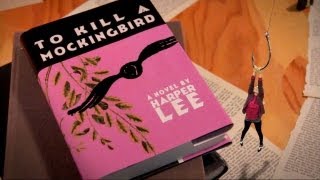(单词翻译:单击)
Think about how your favorite stories hook you.
想想你最喜爱的故事是如何吸引你的。
"When he was nearly 13, my brother Jim got his arm badly broken at the elbow.
我兄弟吉姆在他13岁左右时胳膊受伤了,挺严重的。
When it healed, and Jim's fears of never being able to play football were assuaged,
伤口恢复后,他对以后都不能踢球的担心也减缓了,
he was seldom self conscious about his injury."
他自己几乎没有意识到自己的伤。
"All this happened, more or less.
所有的一切,或多或少都发生过。
The war parts, anyway, are pretty much true.
但是战争那部分内容是千真万确的。
One guy I knew really was shot in Dresden for taking a teapot that wasn't his."
我认识的一个朋友在德累斯顿真的被射中了,就因为他拿了个不属于他的茶壶。
"My father's family name being Pirrip, and my Christian name Philip,
我父亲姓皮日普,我的教名是菲利普,
my infant tongue could make of both names nothing longer or more explicit than 'Pip.'
我在小时候两个名字都叫不准,顶多叫成"皮普"
So I called myself Pip, and came to be called Pip."
所以我叫自己皮普,后来就真的成了皮普。
Imagery, intrigue, emotion: each introduction makes you want to read more.
富含想象力,情节,情感因素的引言,都会让你想读下去。
If you have an assignment to write a literary analysis, your introduction will be just as important.
如果你有一篇文学作品分析的作业,引言也一样重要。
There will be four elements in your essay: your introduction, thesis statement, analysis and conclusion.
你的文章需由四部分组成:引言,主题论述,分析和结论。
If you begin writing a literary analysis with the introduction, you may be discouraged.
如果你的文学分析和引言一起开始写,那你可能会大受打击。
Here's a tip for writing a great introduction: Write it last, and write your thesis first.
以下是写好一篇引言的技巧:先写论题,最后写引言。
Figure out what you want to analyze before you actually analyze it.
在你真正进行分析前,明确你想要分析什么。
Your thesis is the foundation for the rest of your essay, including your introduction.
你的论题是文章的基础,包括引言在内。
So how do you find your thesis? Start by asking questions.
那么,如何确定论题呢?由问问题开始。
To Charles Dickens you may ask, "why do you draw attention to characters' hands?"
拿查尔斯·狄更斯来说,你可能会问,"你为什么专注于描写角色的手呢?"
"What's up with their names?" "Pumblechook? Really?"
"他们的名字有什么寓意?""彭波契克,真的吗?"
To narrow your concept for analysis, answer the questions yourself.
试着缩小主题分析的范围,自己来回答问题。
"Estella ridicules Pip's hands, Jaggers constantly washes his hands,
"埃斯特拉嘲笑皮普的手,贾格斯不停的洗手,
Pip insufferably burns his hands, Mrs. Joe brings Pip up by hand."
皮普难以忍受地灼烧双手,乔伊亲手带大皮普。"
Are there patterns in your answers?
这有你要的答案吗?

Estella's comments smack of cruelty, while Jaggers' cleanses his immoral conscience.
艾斯黛拉的评论带有冷酷的味道,然而,贾格斯却掩盖他邪恶的良心?
Pip finds a second chance, while Mrs. Joe abuses a child under the guise of love and dedication."
当乔夫人在爱和奉献的伪装下虐待一个孩子时,皮普找到了第二次机会。
What can you analyze with this pattern?
你从这个图案中分析到什么?
"Hands symbolize social class inequities, and through Dickens' criticism,
手象征社会阶级不平等,通过狄更斯的批判,
he exposes the dire need for reform in Victorian London.
他揭露了在维多利亚时代的伦敦的改革的必要性。
What you will do next, which is an entirely different lesson, is to draft and revise your analysis.
接下来你要做的是完全不同的课程,那就是设计并修正你的分析。
Only after you write your analysis, return to your introduction.
只有在你写出你的分析之后,才能回到你的引言
Like authors earlier, try to intrigue and inspire your reader.
就像早期的作者,试着去激发和鼓励读者
Avoid starting with famous quotations, dictionary definitions or rhetorical questions.
避免用名人名言、字典的定义或夸张的问题来开头。
Consider the historical context of your topic, or an anecdote or some larger idea or concept. Here's an example:
仔细想一下你的主题的历史背景、趣闻,或一些大的想法或观点。举个例子
"27 bones in the hand and wrist allow humans to concurrently create and destroy.
手上和手腕的27块骨头,使人们能够同时创造和破坏。
Thousands of hands have been behind history's astounding creations.
成千上万只手能够创造出历史上惊人的作品。
Hands represent a powerful symbol, one that was not lost on Charles Dickens.
在查尔斯·狄更斯笔下,手一直是强有力的象征。
In Great Expectations, Dickens uses hands to symbolize social class inequities,
在《远大前程》一书中,狄更斯用手来象征着社会阶级的不平等
and through his criticism, he exposes the dire need for social reform in Victorian London."
通过批判,他揭露了维多利亚时代的伦敦的社会改革的必要性。
Take time crafting and revising your thesis and introduction.
花些时间制作并修改你的论点和引言
Remember, if you are bored while writing, your reader will be bored while reading.
记住,如果你在写作时感到厌烦,那么你的读者也会在阅读你的作品时感到无聊。
By the way, did you notice the introduction to this lesson?
顺便说一下,你注意到本课的引言了吗?
It didn't start with "here's how to write a thesis and introduction. Would that have hooked you?
它并不是'以怎样写论点和引言'开始的。如果是的话,那还会吸引你吗?


